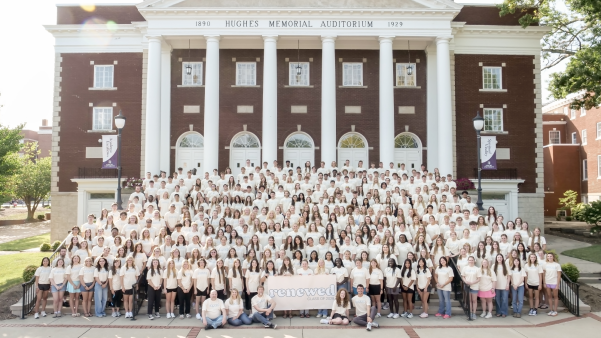
Editor’s Note: This article is part of “Change Makers,” our recent CT special issue focused on some of the ways women are influencing the church, their communities, and the world. In this special issue, we’ve included articles that explore trends in women’s discipleship, examine research on women and workplace leadership, highlight women who are making a difference, and grapple with the unique challenges female leaders face. Click here to download your own free digital copy of “Change Makers.”
Chuck Norris is a big reason why Talitha Phillips first took the helm of Claris Health. Back in 2001, the actor and his wife were expecting twins, and they asked Phillips to work for them as a night nurse when the babies arrived.
Shortly before, Phillips had been offered the role of center director of California-based Claris, which provides comprehensive services to those facing unintended pregnancies. But she was only a year out of college and had large school loans to pay off. Taking on a half-time role at a nonprofit didn’t seem possible. She remembers praying, God, if you want me to work at this place, you need to make this happen.Then along came Norris and his expanding family, who provided the financial means Phillips needed in order to pursue a line of work that captivated her for deeply personal reasons.
Just a few years earlier, Phillips had gotten pregnant at the age of 19. At a local women’s clinic, she was told, “You’re so young. You have your whole life ahead of you. We can make this go away.” Feeling trapped trapped, she made the only decision she thought she could: an abortion.
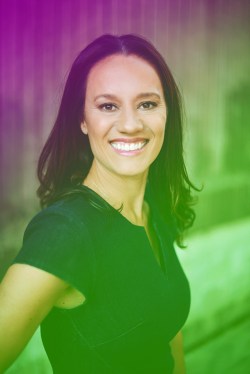
Having an abortion haunted Phillips for two years, until she happened upon an ad for a post-abortion support group. “When I finally got up the courage to call, it was the most life-changing moment,” Phillips remembers. She had feared that she was the only “good Christian girl” who’d had an abortion. Instead, the kind woman on the other end of the line told her, “You’re not alone. There are other women and girls who have been through this. Would you like to meet them?”
That support group was hosted by a small organization called Claris Health. There, Phillips experienced profound healing and transformation as a client. She later became a volunteer and today is the CEO of the rapidly expanding organization—putting her in a fairly small group of women who lead Christian nonprofits.
A lack of female leadership
Despite being the dominant workforce in the nonprofit sector as a whole—making up as much as 75 percent of employees—women still lag behind men in nonprofit leadership positions. Across the US, women compose about half of nonprofit board members and one-third of nonprofit CEOs. In organizations with budgets exceeding $10 million, those numbers drop to 40 percent and less than 25 percent, respectively.
Unfortunately, evangelical nonprofits have even less female representation in leadership. According to a recent study by Gordon College and the Imago Dei Fund, women occupy leadership positions in evangelical nonprofits at less than half the rate as the overall nonprofit sector: “Only 5 percent of Christian colleges had women serving as presidents, and only 5 percent of large nonprofits (with budgets over $10 million) had women serving as CEOs and presidents.” This puts evangelical nonprofits on par with the business sector, where a Pew Center survey found that just over 5 percent of Fortune 500 CEOs are women.
On top of this, on the whole female nonprofit leaders tend to be paid less than their male counterparts, by anywhere from 8 to 23 percent, according to nonprofit research firm GuideStar.
No wonder, then, that Christian women who end up in nonprofit leadership positions often have to take risks, either financially or professionally, to make their aspirations a reality. They make the most of unexpected opportunities and the encouragement of mentors, and capitalize on whatever professional experience they can gain. Most importantly, though, they are driven to overcome any barriers to entry by a deep and personal passion to address a particular social need—and by their abiding faith in an inclusive, merciful, and just God.
Driven by lived experience
Chantal Huinink of Ontario, Canada, was born with cerebral palsy and spent much of her early years trying to measure up to able-bodied individuals. Then she came to understand that God wanted to use all things in her life for good, “not just the things we like about ourselves.”
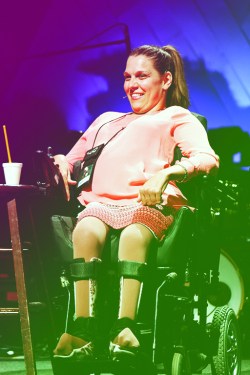
A longtime fan of Joni Eareckson Tada’s music and advocacy work, Huinink took the risk to write her a letter and ask about becoming involved in the work of the international disability ministry Joni and Friends. To Huinink’s great surprise, Tada wrote back and invited her, then a college student, to visit their office in Southern California.
“I knew that God was up to something because it was rather miraculous that I could get the funds together and organize my attendant care so quickly,” she recalls. Even more peculiar were the words she heard herself saying to Tada after she arrived: “Joni, when I'm done with school in December I'm going to come and work with you for three months.” Huinink had no such plans to do this until she said it, but just a few months later, she relocated to California for a three-month internship.
Afterward, Tada connected Huinink with a like-minded organization in Canada called Christian Horizons. Today she serves as their coordinator of organizational and spiritual life while also studying in seminary, serving as a church elder, and speaking regularly at Joni and Friends events around the world.
“These are not roles that I planned for or pursued,” Huinink says. She began by simply wanting opportunities that utilized her lived experience as a woman with physical disabilities and that served others in a meaningful way.
Jenny Yang’s road toward becoming the senior vice president of advocacy and policy at World Relief also began with a lived experience. The daughter of South Korean immigrants, Yang studied abroad in Spain while a junior at John Hopkins University. Then, as now, the European country was having a fierce internal debate about the many African migrants who were arriving at their borders.

“It was something I had never thought about,” Yang remembers. While in Spain, she realized that migration is a global phenomenon. “It’s a fundamental aspect of the human experience. It challenges our very thinking about who we are and our attitude toward others and identity.”
Yang clearly recalls riding the subway one day and seeing an African mother with her young children. Soon after, a group of young Spaniards boarded and spray-painted these words on the subway car wall: “Get out of my country, black people!”
“It bothered me to see such blatant racism, but it bothered me even more that no one said anything,” said Yang. That summer, she volunteered with a United Nations refugee program, and later volunteered with World Relief. After two years working for a political consulting company—which honed Yang’s understanding of the political process and effective means of advocacy—she applied for a full-time staff position with World Relief.
Anger and action
Finding one’s calling in the nonprofit sector often involves “wrestling with the question of what makes you angry,” explains Andrea Ramirez, executive director of the Faith and Education Coalition of the National Hispanic Christian Leadership Conference. For Ramirez, the cause of her anger is “seeing smart children who see themselves as unintelligent. I want to connect these children to a body of support and help them know they can love the Lord with all their minds.” She works closely with local church leadership in the majority of states to engage advocates for education equity.
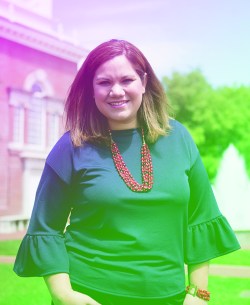
Ramirez has seen firsthand the cost of education inequality. As a graduate student at Dallas Baptist University, she worked as an academic adviser to college students while also serving on a youth ministry team in inner-city Dallas. In a community in which gang involvement and poverty were endemic, many young people were unable to flourish in school.
“I was seeing the dichotomy: I was seeing higher-education students who had gone on a different path and realized that an undergraduate degree was critical for them,” she told CT. “Conversely, I was at prayer meetings where the students would be telling me basically what was going to be on the ten o’clock news that night: how their school had been evacuated or the fears that they were facing.”
Mentoring young people who had to care more about their physical safety than their performance in school fostered a deep desire in Ramirez to work toward better educational opportunities for all children. “I believe in the imago Dei of every child and believe they should have access to high quality education,” she said.
Honoring the image of God in others
This conviction of the God-given value of every individual has been a powerful motivating force for each of these women. For some, their lives were transformed—and their passion for service and justice fostered—because someone else first saw the imago Dei in them at a time when they were vulnerable.
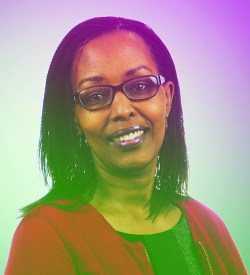
Talitha Phillips is still fueled by the compassion she received at Claris Health as a client, which was in stark contrast to the one-sided story she heard at the abortion clinic. “I don’t want other girls to ever feel like they only have one option,” she explained. “I want to tell them, ‘You have options, and no matter what you choose, we are going to love you and be there for you and get you through this.’”
Born as a Rwandan refugee in Uganda, Christine Baingana was surrounded by poverty and the strong cultural belief that girls did not deserve an education. Fortunately, her parents valued the welfare of all 15 of their children (including 11 girls). Baingana had the same educational opportunities as her brothers and also learned the same skills—knitting and crocheting—in order to make additional income to help pay for schooling. “I never struggled to be heard,” she explained. “I therefore grew up with a healthy sense of self-worth.”
After working in banking, Baingana was appointed as CEO of Urwego Bank, a program of HOPE International in Rwanda. The organization provides that same sense of empowerment and self-worth to underserved Rwandans through financial services like affordable bank accounts and loans.
But even with her self-confidence, Baingana has struggled as a female leader. “In my leadership journey I have been overlooked, sidelined, ignored, and wrongfully categorized,” she admitted. “However, that does not dissuade me from focusing on delivering. I might have to work double hard and take more years to get there, but I keep on with the full knowledge that I can do more and better, given a chance.”
Intentional advancement
Baingana’s determination speaks to the strong desire to lead that is present among female nonprofit professionals, especially in younger generations. A 2014 survey, published in The Chronicle of Philanthropy, found that 72 percent of women under the age of 34 in the nonprofit sector wanted to be in a top leadership position. But significant barriers to advancement remain, including organizational policies and cultures that tend to favor men over women.
Breaking such institutional inertia requires initiative and intentionality. The Gordon College study recommends several practices to promote more women in leadership, including creating initiatives and setting goals around diversity; having senior leaders actively and vocally affirm women in leadership; and increased training on barriers faced by women.
Yang has personally experienced the benefits of management that actively promotes women leaders. At World Relief, “there’s been a value for women leadership,” she explained. Since joining the organization 12 years ago, she has been intentionally mentored and has had multiple opportunities to move to new positions.
The unique gifts women bring
But for such a path to be possible, existing leaders must believe in the importance of welcoming women into roles of influence. “Diversity is an asset. It’s not a detriment,” Yang asserts. “Any time you have a variety of voices at table, that strengthens decision-making and capacity.” She believes female representation is particularly relevant for nonprofits, where women are almost always part of the target clientele. “It’s important that the people you serve and work with see people in the organization who look like them.”
As both clients and nonprofit leaders, women “think differently and bring a unique perspective,” says Ramirez. “We represent a part of the body of Christ. When we’re not present, all that is absent.”
Case in point: When asked about effective leadership, all five women spoke of the importance of humility and collaboration. “Leadership is not about knowing and doing everything. It is about relying on those that know more than you in a given area, learning to trust one’s team, and focusing on fostering unity,” Baingana said.
Their Christlike humility and the value they place on the contributions of others may very well stem from the fact that these five leaders recognize they did not make it this far on their own. Often in strange and unexpected ways, God has provided opportunities, relationships, and experiences that have uniquely equipped them to recognize the suffering of others and to offer their gifts in the hope of alleviating that suffering.
And wherever God calls these remarkable women, along with countless others like them, they bring life to those in need—whether they are refugees, pregnant women, students, people with disabilities, or other underserved populations. “I believe women, whether they are moms or not, have been given the ability to give life,” Ramirez said. “We help to birth ideas and organizations and new insights.”
They simply need more opportunities to do so.
Dorcas Cheng-Tozun is an award-winning writer and editor from Silicon Valley who has lived in mainland China, Hong Kong, and Kenya. Start, Love, Repeat, her book about marriage and entrepreneurship, will be released by Hachette Center Street in November 2017.














